Golda Poretsky's Blog, page 25
June 20, 2011
Body Acceptance Is Not A Lazy Choice
by Golda Poretsky, H.H.C.
www.bodylovewellness.com
Listen to the podcast of this post here:
Earlier this week, I had a really infuriating call with a member of my family.
She told me that despite all this "body acceptance stuff," I had to start taking care of myself. When I asked her what she meant by that, she said, "making healthier food choices."

These ladies don't look lazy in this painting by Peter Paul Rubens. Image courtesy of wikipedia.
This is a woman I see about once every other month at family gatherings. So the only way that she could have decided that I was making "bad food choices" was that I was fat. Fat like nearly everyone else in my family, of course, but fatter than her. So I asked her if she meant a diet. "No, not a diet. Just better choices," she said. "Come on, you know how to eat right. And you're obviously not doing that."
Obviously. And yes, I "know how to eat." But obviously, she didn't mean the ole fork to mouth. She meant what I had been taught to do since age 4 — follow a plan, restrict, obsess, repeat.
What she was insinuating was that "this body acceptance stuff" was just a mask, a cover for my desire to eat more than I should, make bad choices, and be lazy. This is a person who's known me my entire life, who must assume that I eat normally in front of her and then binge as soon as I get home. (If I did do that, it still wouldn't be her business, but I don't.)
But I don't think body acceptance is lazy in the least. Telling people that you don't and will never diet again, setting boundaries with people around you who are obsessed with fat and weight, sharing your views everywhere you go and facing ridicule and hatred, and making a choice (despite 99% of the world telling you that you're crazy) that this is your life and you're not going to live it encased in self hatred — none of that is lazy. Whether we're dieting, or getting horrific weight loss surgeries or decided to accept and love our bodies, I think fat people are constantly working at something having to do with their bodies. On top of that, fat people have the regular stuff to do that thin people do, like working, taking care of their families, and taking care of all the other stuff of normal life. Plus, because we face discrimination in education, the workplace, and the medical field, we have added stress and pressure and have to work extra hard as a result.
In fact, I have yet to meet the stereotypical, almost mythical fat person that everyone thinks is the usual fat person. This is a fat person who doesn't care about being fat, eats all junk food, never exercises, and doesn't do anything other than laying on the couch eating and drinking soda. The only people I've ever encountered who fit the mythical fat person description are people who are pretty severely depressed, and they're not doing this with a blithe abandon that fat people supposedly exhibit (and are often not fat). These stereotypes get perpetuated by shows like The Biggest Loser, which shows its contestants as people who are out of control with no lives, even if they have families and businesses that they run and rather full lives in reality.
I think there's a myth that body acceptance means not doing anything to take care of your body, and that's totally not true. As I've seen for myself and for my clients, when exercise is not tied to weight loss, we can do it in a way that is aligned with our bodies and with what we find actually fun. When we listen to our bodies and trust them and their messages, we can make appropriate food choices. We can enjoy sex in a different way when we connect to our pleasure rather than worrying over our fat.
So body acceptance, no matter what your size, is the only choice if you want to embrace a happiness that is not centered on a goal weight or a particular size or fitting into a particular pair of jeans. That being said, it's not always an easy choice to make, but it's certainly not a lazy one.
Feel free to let me know what you think in the comments section below!
Golda Poretsky, H.H.C. is a certified holistic health counselor who specializes in transforming your relationship with food and your body. Go to http://www.bodylovewellness.com/stay-in-touch/ to sign up for her newsletter and get your free download — Golda's Top Ten Tips For Divine Dining!
Body Acceptance Is Not A Lazy Choice originally appeared on on June 20, 2011.
June 15, 2011
Will I See You At Full Figure Fashion Week?
Hey New York friends and FFF Week fans!
I'm looking forward to seeing you at Full Figure Fashion Week 2011!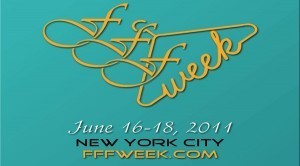
Come by and shop and The Curves in The City Shopping Soiree and and make sure to stop by my at my table! I'll be selling (and signing) copies of Stop Dieting Now and offering some super special surprises and raffle items.
Curves In The City Shopping Soiree
Thursday, June 16th, 2011
10AM – 3PM
Hotel Pennsylvania
401 Seventh Avenue (Grand Ballroom)
New York, NY 10001
$15 entrance fee at the door (online tickets have sold out)
Comment below if I should look for you there!
Will I See You At Full Figure Fashion Week? originally appeared on on June 15, 2011.
June 13, 2011
Are Old Diet Rules Getting In Your Way?
by Golda Poretsky, H.H.C.
www.bodylovewellness.com
Listen to the podcast of this post here:
(I'm bringing back an oldie but goodie this week, but I'll be back "live" next week with an interview with an international fat superhero…)
In a recent workshop, one of the participants brought up the fact that she sometimes doesn't like to eat leafy greens because they remind her too much of her dieting days. Whenever she eats greens (salad in particular), she feels what she used to feel while dieting — restricted and annoyed, and even a phantom-like feeling of hunger.
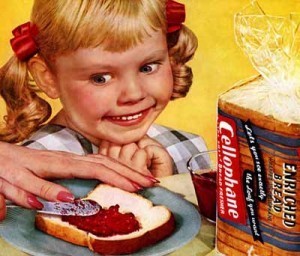
The kid loves jam. Image courtesy of boingboing.net.
How many of you can relate to that feeling? I know I can! When I first started working with the concept of intuitive eating, I felt like I was fighting a never-ending battle with a variety of food rules, even food rules that conflicted with one another. I had spent significant portions of my life as an Atkins dieter, an Overeaters' Anonymous member, a low carbohydrate vegetarian and a Weight Watchers' points aficionado. As you can imagine the Atkins part of me and the low carb vegetarian part of me had some things in common but highly disagreed with the Weight Watchers' point keeper and the O.A. dieter! Did I believe in low carb or low fat? Was a scooped out bagel a good choice or a terrible one? Was I overdoing the olive oil or should I slather it on?
And while I have come to terms with my diet rule demons, as a counselor who often talks about intuitive eating, I can run into some problems. I'm often asked about what foods are good to consider when you're suffering from low energy, but whenever I talk about food in this way, I often have to work my way around my own fears of sounding like a Weight Watchers or O.A. leader. Whenever I talk about leafy greens and added fiber and drinking adequate water, I get a creepy feeling that I'm imposing food rules on my clients, even though I have no intention of doing so. To me, I care more about how my clients actually feel when they eat certain foods than how they should feel or what they should be eating.
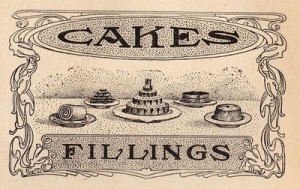
Image Courtesy Of The Graphics Fairy
Diet rules impede intuitive eating because they stop you from connecting with your body's wisdom. Whether you're confining your eating habits to old diet rules or avoiding food that reminds you of your dieting days, you end up being a slave to diets. I'm sure that wasn't (or isn't) your intention if you're trying to break away from diets.
So here are some tips for letting go of old diet rules to make way for a more connected, body-centered way of eating.
1) Get Clarity – Take a moment to write down all of the diet rules that still haunt you. They may be conflicting, nonsensical, or sometimes sort of sensible. Whatever they are, get them all out on paper. Then decide if any are worth keeping. Only keep the ones that really honor your body and its changeability – such as getting adequate water, avoiding allergenic foods, stuff like that. Throw out any rules that limit the types of foods you can eat (unless you have allergies or other health concerns) and definitely toss the calorie and carb counting.
2) Listen To Yourself – We all have a voice within us that tells us what foods nourish us and advises us as to our hunger and fullness. Note, we ALL have this voice. Sometimes this voice has been stifled by pushy parents or diet rules or our emotional torment, but trust me, it is there. Take steps to actively listen for this voice. Honor it no matter how quietly it speaks. If you think you heard it and turned out to be wrong, listen for it again tomorrow. Trust me that it is safe to trust yourself.
3) Pay Attention – Notice which foods feel best to you. Do you like a muffin and coffee in the morning or an apple and almond butter and tea? Does it depend on how much sleep you got, how much stress you're under? What time of year it is? Are comfort foods comforting sometimes and sometimes not so much? Notice the effects on your energy levels. Notice comfort and discomfort.
Continually repeat the above to get better and better at tuning in.
In truth, the only rule is that there are no rules. You make the rules. It's okay to be heady with that power as long as you let your body lead the way.
Golda Poretsky, H.H.C. is a certified holistic health counselor who specializes in transforming your relationship with food and your body. Go to http://www.bodylovewellness.com/stay-in-touch/ to sign up for her newsletter and get your free download — Golda's Top Ten Tips For Divine Dining!
Are Old Diet Rules Getting In Your Way? originally appeared on on June 13, 2011.
June 6, 2011
"Real Women," PCOS & Body Image
by Golda Poretsky, H.H.C.
www.bodylovewellness.com
Listen to the podcast of this post here:
When I wrote this cranky post about the "real women…" phenomenon, I never expected it to resonate with so many women.
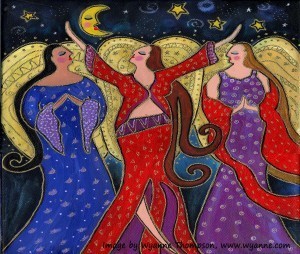
Image By Wyanne Thompson www.wyanne.com
It seems that fat, thin, in between, curvy, not curvy, in between, cisgender, trans, various gynecological surgeries or symptoms, or whatever, there's a lot of crap that makes us feel like not so real women.
For most of my teenage/ adult life I felt like not very much of a real woman due to having polycystic ovarian syndrome (P.C.O.S. for short.) (This is not something I write about much, but I feel on a deep level that sharing it will be helpful to some of you, so I'm going for it.) For those of you who don't know what that it is, it's basically a cluster of symptoms that people who have it get to varying degrees, including irregular or absent periods, weight gain, hirsutism, acne, anovulation, infertility, ovarian cysts, and insulin resistance (with a higher chance of type 2 diabetes). Some women get only one or two symptoms and they're mild and some get nearly all or all of them quite severely.
Back when I was a preteen, P.C.O.S. was not on anyone's radar. I went on The Pill as a young teenager to regulate my periods, which worked for a while, but now some researchers think it only makes P.C.O.S. worse. Over the years, I've treated this with everything from hormones to acupuncture to meditation to vitamins and supplements to dietary changes. (Some of you, I'm sure, are going to comment that I just need to do X, Y, and Z to make it better, and I can assure you that I've probably tried X, Y, and Z multiple times.) I used to blame myself horrendously for my absolute failure to heal the P.C.O.S., and truthfully, a big part of body acceptance for me was accepting that I'm not a horrible person for not being able to get a period regularly. Spending as much time around holistic types as I did, you can sometimes feel shame for not being able to cure something with the right amount of probiotics, Bach's flower remedies, and meditation.
I also had to come to terms with the idea that I was "not less of a woman" for it. I think a big part of the fact that I mostly had guy friends until my late twenties was that guys don't complain about menstrual cramps nor talk about how fat they are (although lately, I think that's changed). I always dreaded the periods and fat conversations. Having P.C.O.S. always seemed like a failure and something to be ashamed of. Unlike fatness, it's something that you can hide pretty well, until your roommate keeps taking your tampons and then notices that you don't replace them very often.
Over the last few years, I've changed my internal discourse around my womanhood. I've realized that I'm not "less of a woman" (whatever that might mean) just because I don't get the requisite number of periods. I want to make choices that are as healing as possible for me/my body, but one of those choices is choosing to let go of the stress and striving and worrying about this.
Have you struggled with feeling like a "real woman" due to P.C.O.S. or anything else? Let me know what you think in the comments section below!
Golda Poretsky, H.H.C. is a certified holistic health counselor who specializes in transforming your relationship with food and your body. Go to http://www.bodylovewellness.com/stay-in-touch/ to sign up for her newsletter and get your free download — Golda's Top Ten Tips For Divine Dining!
"Real Women," PCOS & Body Image originally appeared on on June 6, 2011.
June 2, 2011
THROUGH THIS WEEKEND ONLY: Amazing Rate On The How To Heal From Emotional Eating Teleseries!
Hey there!
As a beloved blog reader, I wanted to let you know about a really special deal that's only available through Sunday!
You see, last March I did a live, 3 part teleseries on How To Heal From Emotional Eating. We covered A LOT of material, including what to do when you find yourself eating unconsciously, how to connect with your hunger and fullness levels, how to let go of the guilt that keeps you stuck in emotional eating patterns, and so much more.
So now I've put together the mp3′s, handouts and more, added in some special bonuses, and put it all together in a neat little package on the site.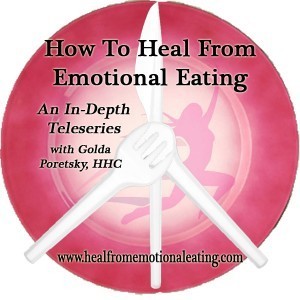
Truthfully, I think this course is a steal at the normal investment of $147. But I'm really committed to sharing these healing tools with more and more people. So from today through Sunday night (midnight, Eastern time), I'm offering this course, for only $47.
To get IMMEDIATE access to the course for only $47, click here: http://www.healfromemotionaleating.com/limited.
Here is just a sampling of what you will get from this course!
Learn what to do when you find yourself eating unconsciously
Understand what cravings really mean and give your body the nutrition it needs
Learn how to connect with your body's hunger and fullness levels
Master my unique process for healing from long held emotional eating patterns
Get Health At Every Size based counseling — scientifically proven to positively influence health indicators more than diet programs
Bonus calls to support you in making your new eating skills "stick"
And so much more!
To receive a special, limited-time rate for this course, you must register by midnight Eastern on Sunday. Go here to learn more: http://www.healfromemotionaleating.com/limited. I won't offer this course again at this low investment level.
With love,
Golda
P.S. Please don't forget to share this special deal with friends! Feel free to copy and paste this:
Thru this weekend only! Amazing deal on How To Heal From Emotional Eating w/ @bodylovewellnes –>http://bit.ly/kK7Adu
THROUGH THIS WEEKEND ONLY: Amazing Rate On The How To Heal From Emotional Eating Teleseries! originally appeared on on June 2, 2011.
Getting Enough Vitamin D
by Golda Poretsky, HHC
http://www.bodylovewellness.com
As I mentioned last month and the month before, I was approached by Eucerin to write a few posts about Spring/Summer skin and provide some swag to a few lucky readers (and, full disclosure, myself) and I thought it might be fun to give it a go!
Most of us know how important sun protection is, but what about Vitamin D? Vitamin D is an important nutrient for bone health, immunity, and cardiovascular health. So how do we take care of our skin and still get enough?
Truthfully, I've heard a lot of different things. It's true that your skin uses UVB rays to create Vitamin D, but how much sun exposure you need can depend on a lot of things. So where do you start?
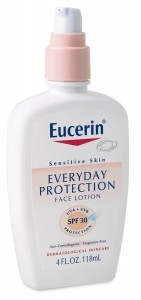
Eucerin Everyday Protection Face SPF 30 4oz (Part Of Prize Pack)
1) Get About 20 Minutes Of Sun, When You Can — Most experts say that 20 minutes or so of sun a few times a week is enough for most people to create enough Vitamin D.
2) Eat Vitamin D Rich Foods – Foods like fish, eggs, and fortified milk all contain Vitamin D, and can give you that extra boost when sun exposure isn't enough.
3) Supplementation — My vitamin D levels tend to be really low. I'm not sure why, but they are, despite whatever sun exposure I get. So I usually take a sublingual Vitamin D. My favorite is from Biotics Research.

Me Wearing My Prize Pack Hat & Trying To Take A Picture Without Looking Like I'm Taking It
4) SPF Stuff Is Still Important! — Definitely use products with sunscreen or a good sunscreen on its own if you plan to be outside for long. And, if you're interested in some SPF swag, might I recommend the following…
Go to the Eucerin Facebook Page to take the pledge, join the movement and share tips on how you plan to keep your skin safe this summer.
Leave a comment below (with a valid email address) and a winner will be picked at random from the commenters on June 30th. The winner will Everyday Protection Face SPF 30 and Body SPF 15 Lotions, Target Gift Card, Facial Spritz and Sun Hat.
Happy swagging!
Full Disclosure: I'm receiving Eucerin products (for my readers and me). The thoughts and opinions, however, that I share in this post are strictly my own and are not influenced by receipt of these products.
Getting Enough Vitamin D originally appeared on on June 2, 2011.
May 31, 2011
Real Women Have Curves, And Don't Have Curves, And Have A Few Curves, And Whatever
by Golda Poretsky, H.H.C.
www.bodylovewellness.com
Listen to the podcast of this post here:
Lot's of very well meaning people, when they find out what I do for a living, say something to the effect of:
"Right on! Real women have curves!"

Real Women Have Curves. Maybe. (Image from wikipedia)
I know they mean well. They're saying that women's bodies are more curvaceous than the emaciated bodies that are often held as an ideal by the media. But the whole concept drives me bonkers. And if it hasn't driven you bonkers yet, let me explain why it drives me bonkers and you may end up agreeing with me.
1) Women Are Women, Curvy Or Not – Women's bodies (just like men's bodies) come in a diverse range of shapes. There are plenty of curvy thin women and curvy fat women, not curvy thin women and not curvy fat women. There are plenty of fat women with proportionately small hips and proportionately big hips. There are plenty of thin women with the same. Same for breasts. Same for everything. There are also some men with bigger hips and smaller hips and bigger breasts and smaller breasts. In other words, there are plenty of "real women" who are not f-ing curvy and are still quite real, and sometimes even, quite fat.
2) What The Heck Is A Real Woman, And Why Should We Care? – Personally, I think that anyone who identifies as a woman is a woman. I don't really care if she has curves or a vulva or whatever. I'm guessing that if you're reading this blog, you probably don't care to much about it either. But aside from that, does it help anything to refer to larger women as "real"? Does that make thin women fake? Or not really women? Ugh. See item #4.

Which of these women is more real? (Image from Marie Clarie UK Online)
3) Can We Just Say FAT For Once? — I personally hate the curvy euphemism. I hate it more than most others, like large or even plus size (though I agree with Queen Latifah that plus size should be "buried"). Curviness has way more to do with chest/waist/hip ratio than anything else, and I think our fixation on those measurements has added to the negative way that most women view their bodies for decades.
4) Relegating Thin Women To A Lesser Status Isn't Helpful – I realize that bigger women have been put down, discriminated against, considered non-ideal, and worse, and that is really, really wrong and needs to change. But I don't think the way to create that change is to try to prove that bigger is better. How about we just start to see that bigger is great too. We don't have to relegate ourselves to a scarcity model of beauty and "realness" belong to only a select few. Perhaps one doesn't have to be better than the other. Perhaps we can see that there's a thing called body diversity, that beauty comes in all shapes and sizes, and that attraction is viable among people of varying weights.
So, yes, real women have curves, and don't have curves, and whatever, at least that's what I think. Let me know what you think in the comments section below!
Golda Poretsky, H.H.C. is a certified holistic health counselor who specializes in transforming your relationship with food and your body. Go to http://www.bodylovewellness.com/stay-in-touch/ to sign up for her newsletter and get your free download — Golda's Top Ten Tips For Divine Dining!
Real Women Have Curves, And Don't Have Curves, And Have A Few Curves, And Whatever originally appeared on on May 31, 2011.
May 23, 2011
Your Imperfect Health!
by Golda Poretsky, H.H.C.
www.bodylovewellness.com
Listen to the podcast of this post here:
I'm bringing back and oldie and goodie this week. Enjoy!
I think many of us walk around with the feeling that we're not measuring up in terms of having "healthy habits." Consciously or not, we think that if we could just work out all day, eat "perfectly" (whatever that might mean for you), meditate consistently, etc., that we would be "in perfect health", never get sick, be the "perfect" weight and have "perfect" lives.
Does this sound anything like you? If it does, then you probably also spend a good deal of time wishing you could be more perfect and feeling that you're not. And that's no way to live.
When you've spent as much time studying holistic health and nutrition as I have, then you encounter a lot of people who probably live as close to the ideal as possible. And let me tell you, they still get sick. They still get obsessive about food and health and exercise and meditation. They still have problems at work and get mad at their kids.
In other words, perfection ain't so great.
One of my client's is a novel writer with a day job as an administrative assistant. At least two nights a week, she finds herself staying up until two or three in the morning, working on her novel. She told me that she really wanted to change this habit, because she had read about how staying up late can throw off your cortisol levels and mess with blood sugar. She told me that after she stays up late to work on her novel, she still feels fine the next morning at work, often feeling more energized because she feels good for having worked on her book the night before. Yet, she was adamant about going to bed earlier. I worked with her on some relaxation techniques so that she could try going to bed at 11PM, even on those nights where she felt compelled to work on her novel.
At our next session, I asked her how her going to bed early had worked for her.
"Golda, it was terrible," she told me. "Most of the time, I would stay in bed thinking about my novel until 2 or 3 in the morning, but not working on it. Once I was able to fall asleep at 11pm or so, but I still felt off the next day. I tried to write earlier in the day but it just wouldn't flow. I haven't made any progress on my book." She paused and took a deep breath. "I think I'm just going to do my usual thing from now. I feel better that way anyway."
That's the thing about trying to be perfectly healthy. Sure, staying up too late all the time can mess with cortisol, but not staying up when she was dying to write was messing with her soul.
Health isn't about being "perfect" with food or exercise or herbs. Health is about balancing those things with your desires. It's about nourishing your spirit as well as your body.
If you want to change health-related habits, that's fine, but do so without judgment. Let yourself balance your desire to be more healthful with your other desires and goals in life. Remember your real goal — it's not perfection, it's happiness.
Golda Poretsky, H.H.C. is a certified holistic health counselor who specializes in transforming your relationship with food and your body. Go to http://www.bodylovewellness.com/stay-in-touch/ to sign up for her newsletter and get your free download — Golda's Top Ten Tips For Divine Dining!
Your Imperfect Health! originally appeared on on May 23, 2011.
May 18, 2011
Dancing With Body Positivity Workshop @ Re/Dress (Brooklyn)
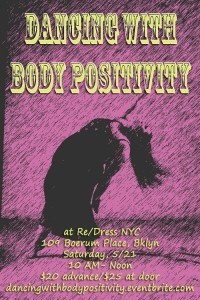 Register here!
Register here!
Please upgrade your browser
Immerse yourself in two hours of pure, joyful body positivity!
Golda Poretsky and Ragen Chastain are two divas of the Body Positive world who are coming together for one fabulous and rare workshop.
In this 2 hour experience we'll talk about how to live body positive in a body negative world from both a physical and emotional perspective. You'll dance with plus-sized professional dancer Ragen Chastain who will teach a routine and modifications that make it fun for people of all levels and abilities. It will be a chance to move for the pure joy of movement and explore ways to connect with your amazing body.
Then Golda will share some of her top techniques for feeling sexy and confident no matter what your size. She'll help you shift the negative thoughts that you may have about your body so that you stop comparing and despairing and start appreciating the body you have right now.
This class is for people of any size, shape, gender, and age who want to bask in body positivity.
Make sure to register early, space is limited and Ragen is in from Austin, TX and will only be doing one workshop!
Please wear clothes that you can move in comfortably.
Register here!
Please upgrade your browser
About Ragen & Golda:
Ragen Chastain is a three-time National Champion dancer, and in addition to teaching dance workshops she writes and speaks about self-esteem, body image and Health at Every Size. Ragen has educated and entertained organizations including Rotary International, the Girl Scouts, and the University of Texas at Austin. You can find her blog at www.dancesiwthfat.org and be sure to catch her in the soon-to-be-released Darryl Roberts documentary "America the Beautiful: Health for Sale".
Golda Poretsky, H.H.C. is the founder of Body Love Wellness (www.bodylovewellness.com), a wellness company that provides individual and group counseling from a Health At Every Size perspective. Via her blog, podcast, and counseling programs, she helps women get off the dieting roller coaster, give their bodies what they really crave, and love their bodies and themselves. Golda's programs and activism work have been featured on CBS's The Early Show, ABC's Nightline, NBC's LX New York and Time Out New York. She is also author of the new book, Stop Dieting Now: 25 Reasons To Stop, 25 Ways To Heal.
Dancing With Body Positivity Workshop @ Re/Dress (Brooklyn) originally appeared on on May 18, 2011.
May 16, 2011
Size Positive Spotlight: Treme On HBO
by Golda Poretsky, HHC
http://www.bodylovewellness.com
Listen to the podcast here:
Podcast Powered By Podbean
I was hooked on Treme from the first episode. For those of you who haven't heard about it, it's a show that follows the lives of a number of inter-related characters in post- Hurricane Katrina New Orleans. It's been getting a lot of acclaim for its great writing, moving storylines, amazing music and fine acting.
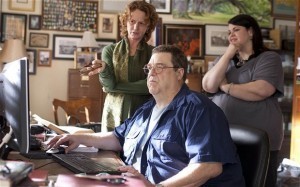
Fabulously Fat Characters On Treme (Courtesy Of The Telegraph UK)
But the thing that I like most about it is the way that size diversity is treated as the norm for the show's characters.
Season #1 had two fat main characters: Antoine Batiste, played by Wendell Pierce, and Creighton Bernette, played by John Goodman. And although I really wish there were a fat, female main character, fat supporting women crop often as attorneys (like Toni Bernette's colleague), teachers, musicians, friends, and lovers. Many of the musicians who play themselves on the show are also fat.
The really great thing about all of this fabulous fatness is that fatness is never a storyline. It's never mentioned. No one talks about diets or weight loss or whatever. Every character, fat or thin, has good things about them and not so good things about them. Fatness isn't a sign of weakness or strength or good or evil or whatever. It just is. Fat people aren't relegated to flat characters. They have depth, they live their lives, they dance, they get laid.
Wendell Pierce As Antoine Batiste [Courtesy of HBO
The normality of fatness on Treme shouldn't be weird, but it is. If you think about television right now, it's hard to think of a show that doesn't pathologize fatness (The Biggest Loser, Heavy, Shedding For The Wedding) or leave out fat characters altogether (nearly everything else on TV). The only slightly size positive show that I can think of other than Treme is Modern Family, which features Eric Stonestreet as a fat, gay father and Rico Rodriguez II as a fat, precocious ten-year-old, and their fatness, again, isn't part of the storyline. However, the women on that show, as usual, are all really thin.Treme is really what TV should be — well-written, entertaining, and representative of real people. In other words, it's just the kind of show that gets canceled too soon (except on HBO, right?).
Are there any fat positive shows out there that I'm missing? Let me know in the comments section below!
Check out the Treme trailer here:
Trailer
If you don't have HBO, you can get the first season of Treme here.
Golda Poretsky, H.H.C. is a certified holistic health counselor who specializes in transforming your relationship with food and your body. Go to http://www.bodylovewellness.com/stay-in-touch/ to get your free download — Golda's Top Ten Tips For Divine Dining.
Size Positive Spotlight: Treme On HBO originally appeared on on May 16, 2011.




